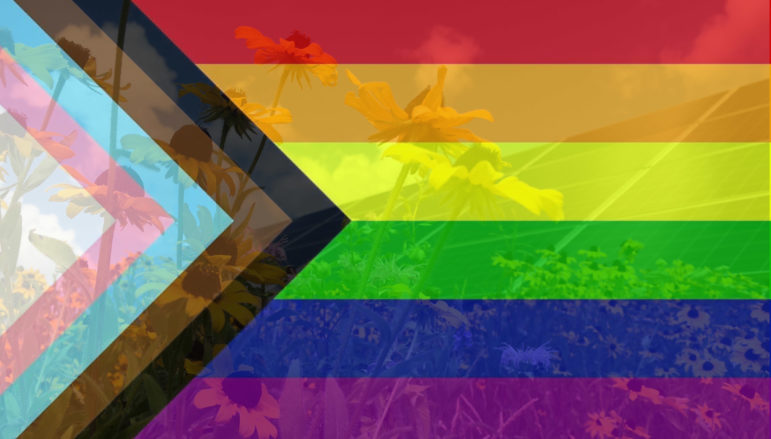
June – Pride month – provides an opportunity to reflect on and recommit to Fresh Energy’s efforts to support an equitable and inclusive environment both within the organization and in our external advocacy work. In doing so, it is also imperative that Fresh Energy, and all those who celebrate Pride, incorporate intersectionality into this reflection.
Fresh Energy recognizes that our interconnected social, political, and ecological systems lead to unfairly unequal outcomes in the Twin Cities, Minnesota, the U.S., and the world. Traits such as race, gender, class, and sexuality are all interrelated factors that lead to “overlapping and interdependent systems of discrimination and disadvantage” that impact an individual’s experience in the world in a multitude of ways. For example, Black transgender folks – who face racism and transphobia – are much more likely to be homeless, unemployed, and live in poverty, as compared to White transgender folks, and especially compared to the general U.S. population.
Climate change adds an additional factor that creates and intensifies existing de-stabilizing conditions for individuals and communities, through extreme weather such as heat waves and extreme storms. Heat waves are shown to impact under-resourced (also known as “low-income”) communities – which are disproportionately comprised of folks who are Black, Indigenous, and people of color (BIPOC) – the most. Across the U.S., research has linked hotter neighborhoods with the discriminatory housing practices known as redlining. Heat waves can worsen several existing health conditions, sometimes with deadly effects. For BIPOC communities, who already are less likely to have access to healthcare, capital, and other resources, the additional expense or adversity caused by a healthcare crisis; the increased utility bills to cool a home during a heatwave; or storm damages to housing can have an outsized and disproportionately negative effect as compared to communities that are well-resourced (and more likely to be White). Folks who are LGBTQ+, especially those who are BIPOC and therefore embody more intersectional identities, are more likely to be vulnerable to the effects of a warming planet.
This moment in time provides ample evidence of the ongoing impacts of overlapping and historic disparities. As a relatively narrow example, the protests in Minneapolis that resulted from the murder of George Floyd were an impassioned outcry against the police brutality that disproportionately targets Black people in Minneapolis. Protestors of police violence were, in turn, met with tear gas: a chemical irritant to the lungs, eyes, mouth, throat and skin, banned by the United Nations in warfare, but permitted by the use of American law enforcement against its own citizens.
This harmful exposure came at a time when a global pandemic that attacks the lungs is already killing Black, Indigenous, and Latino folks at up to 2.3 times higher rates than it kills White Americans. In other words, “If they had died of COVID-19 at the same rate as White Americans, at least 14,400 Black Americans, 1,200 Latino Americans and 200 Indigenous Americans would still be alive.”
(Let us pause, and consider the weight of this statement).
Folks that are LGBTQ+ are also at a higher risk for COVID-19, since this population has higher rates of HIV and cancer, and uses tobacco at rates fifty percent higher than the general population. Individuals who are both LGBTQ+ and BIPOC face several factors that put them at particularly high risk of COVID-19.
The conditions that lead to disparate outcomes based on race, class, gender, and sexuality did not come about in a vacuum, and through Fresh Energy’s Energy Access and Equity work and Diversity, Equity, and Inclusion commitments, we will continue to reflect on and improve upon how we can be a more anti-racist and equitable organization. Recently, Fresh Energy, along with leading consumer advocate voices Energy CENTS Coalition and Citizens Utility Board of Minnesota, successfully advocated at the Public Utilities Commission for several critical protections for customers during the peacetime state of emergency. At the start of the June special legislative session, we called on the Minnesota legislature to prioritize the urgent need for transformational police reform and community recovery. And in April, Fresh Energy, along with our housing and energy partners, advocated for state and local officials to prioritize the use of Community Development Block Grant funds from the federal government to help ensure impacted families can remain stably housed during and after the COVID-19 crisis.
While it is important to weigh the overlapping systemic inequities that queer and trans BIPOC folks face, let’s also remember that Pride is a celebration of LGBTQ+ folks. From Marsha P. Johnson – who is credited with starting the riot at the Stonewall Inn in New York City that morphed into the modern day Pride movement; to the young queer activists who are leading the Minneapolis protests; to our family members, friends, neighbors, and coworkers; and the uncounted LGBTQ+ folks of days past and present who remain closeted for their own safety, there is a lot to celebrate.
As Minneapolis City Council Member Andrea Jenkins, the first Black, openly trans woman elected to public office sang to a large community meeting in Powderhorn Park this June, “I hope you don’t mind, I hope you don’t mind, that I put down in words, how wonderful life is, with queers in the world.”
